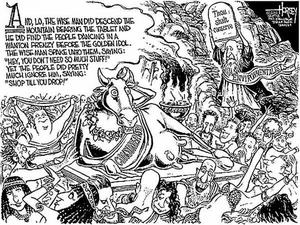
"Consumerism" refers to two quite different things. One is a movement to protect consumers from the negative effects of decisions made by corporations interested only in profit. The other is the tendency of people in affluent societies to devote ever more attention to buying things, to the detriment of religious commitment, tradition, art, community, political involvement or the effort to build a better world. Consumerism in this second sense and environmentalism, both powerful in Western societies, do not coexist comfortably.
Today's cartoon, by American David Horsey, has fun at the ex-pense of both. To get the point of the cartoon, you need to recall the story of Moses in the Bible: At God's command, Moses leads the Hebrews out of slavery in Egypt. They arrive at Mt Sinai, which Moses ascends to commune with God. He tarries; God has much to reveal. The people below conclude that Moses is not returning. They persuade Aaron, the brother of Moses, to make them a statue to worship. Coming down from the mountain with the stone tablets on which the Ten Commandments are written, Moses discovers the Hebrews feasting and dancing around the idol of the Golden Calf. He is, to put it mildly, not pleased.
In David Horsey's cartoon, Moses represents the environmentalists. He comes down the mountain with one commandment: "Thou shalt conserve." It is addressed to Americans, who are notably given to waste, not conservation. Their Golden Calf is "consumerism" - actually a very mature Golden Cow with udders of abundance, reclining in a very laid-back pose. All around is a riot of gluttony and wickedness. Many of the women are wearing fashionable Egyptian clothes. This is not a crowd likely to heed the admonitions of an austere old man ("You don't need so much stuff!") - and from the expression on Moses' face we can see that he knows it.
The weeks between Thanksgiving and Christmas Day are by far the biggest shopping period of the year in the US. This year, even though there are many grounds for economic worry, Americans are buying like crazy. Some economists think they are crazy; others are thankful that they are keeping the US economy from slippingsintosa second recession. Thesgroupsof the day is "Shop till you drop!" Environmentalists looking on this orgy of consumption can only be appalled. (W. D. White)
|
英文中的Consumerism一词可以指两类很不一样的事。一是指保护消费者运动,保护他们免受那些只顾赚钱的公司所做的决定带给消费者的负面效果;二是指消费主义,即富裕国家中出现的将越来越多的注意力倾注于购物的趋向,而这一趋向对于宗教虔诚、传统、艺术、社区建设、关心政治以及为建设更美好世界所付出的努力是有害的。作为这第二种意思的消费主义与环保主义在西方国家都很有势力,但二者是不能和睦共存的。
今天这幅由美国漫画家戴维-霍尔西所画的漫画,讽刺了消费主义与环保主义。要了解这幅漫画的主题,就需要回顾一下《圣经》中关于摩西的故事:在上帝的指令下,摩西带领希伯来人逃出了奴役他们的埃及,来到了西奈山下,他爬上山与上帝交谈。摩西待在山上,上帝有很多话要透露给他。而山下的人们认定摩西不回来了,便说服了摩西的哥哥亚伦为他们造了一个膜拜的雕塑。当摩西拿着写有十条戒律的石碑从山上下来,发现希伯来人正围着偶像金牛犊欢宴、跳舞,心中便大不悦,这么说还是轻的。
在霍尔西的漫画中,摩西代表了环保主义者,他带着一条戒律从山上下来,上写:“你们应当节约”,这话是对美国人说的,美国人特别喜欢浪费而不喜欢节约,他们崇拜的“金牛犊”就代表着“消费主义”--实际上它已经是一只成熟的奶水丰富的“金母牛”了。在它四周是贪食与不道德的放荡人群,很多妇女穿着时髦的埃及服装。这群人看来并不会留意到一个严峻老人的警告(“你们不需要那么多东西!”)--从摩西的表情我们可以知道他是了解这一点的。
从感恩节到圣诞节之间的几周,是美国人一年中购物的最高潮。今年,尽管有很多依据令经济堪忧,可现在美国人买东西就像疯了似的。有些经济学家认为他们真是疯了,但也有人对此心存感谢,认为美国人疯狂购物可以使美国经济不再滑入到第二次萧条中。购物期间的口号是“买、买、买,一直买到累趴下!”而环保主义者看到这样无度的消费也只能是感到惊骇了。
|
![]() 本网站由北京信息港提供网络支持
本网站由北京信息港提供网络支持
![]() 本网站由北京信息港提供网络支持
本网站由北京信息港提供网络支持